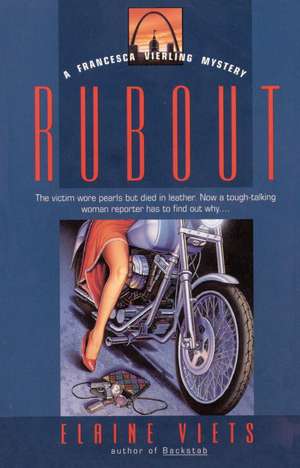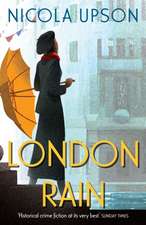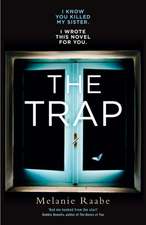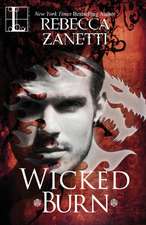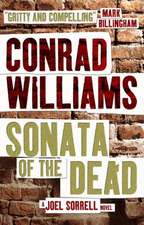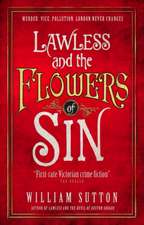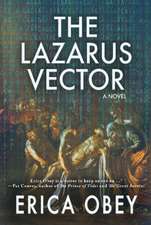Rubout
Autor Elaine Vietsen Limba Engleză Paperback – 30 apr 1998
The victim is a woman who lived well, married bad, and divorced hard. For Sydney Vander Venter, going from high-society wife to tough-talking biker chick was only a phase. One she didn't survive. Now Francesca must find out who ruined the annual Leather and Lace Ball by killing Sydney. But with her career crashing, her love life sputtering, and another murder waiting down the road, Francesca finds out firsthand how dangerous it can be when you're born to be wild--and dare to live that way too. . . .
From the Paperback edition.
Preț: 147.18 lei
Nou
Puncte Express: 221
Preț estimativ în valută:
28.16€ • 29.48$ • 23.44£
28.16€ • 29.48$ • 23.44£
Carte tipărită la comandă
Livrare economică 27 martie-02 aprilie
Preluare comenzi: 021 569.72.76
Specificații
ISBN-13: 9780440613480
ISBN-10: 0440613485
Pagini: 320
Dimensiuni: 136 x 236 x 20 mm
Greutate: 0.41 kg
Editura: DELL JUVENILE
ISBN-10: 0440613485
Pagini: 320
Dimensiuni: 136 x 236 x 20 mm
Greutate: 0.41 kg
Editura: DELL JUVENILE
Notă biografică
A bona fide celebrity in her hometown of St. Louis, Missouri, Elaine Viets was recently voted one of its five "most powerful" citizens by the Riverfront Times. In addition to Backstab, the debut novel in the Francesca Vierling mystery series, Elaine Viets is also the author of the humor book How to Commit Monogamy.
From the Paperback edition.
From the Paperback edition.
Extras
Red police lights pulsed on the Casa Loma's walls and mist rose from the alley potholes, turning the murder scene into a hell's parody of the biker ball. For music, we had the shriek and wail of sirens. Yellow police-line tape festooned everything like some failed festive decoration. The T-shaped alley behind the Casa Loma was blocked at all three entrances, by what seemed to be every police car, marked and unmarked, in St. Louis. There was even a hook and ladder truck. The Evidence Technician Unit arrived, and police searched the alley carefully with flashlights to make sure they didn't miss anything before they brought in the bulky vehicle. The ETU pulled up near the murder scene. Harsh lights on the roof illuminated the alley. An evidence technician snapped Sydney's photo from every angle, and they were all bad. Sydney had been beaten until the fragile bones in her face cracked and collapsed. I could see some of the brutal damage even through the thick blood. I saw her small, blood-smeared hands, still trying to protect her face. Two nails were broken, but her hands were still beautiful, well tended, and useless. Like Sydney.
She'd been beaten with what looked like a motorcycle drive chain. It was artlessly draped near the shoulder of her leather jacket, as if the designer put it there for a prop. I'd just about convinced myself that the gobs of dark stuff on the chain were grease. Then I saw the clump of pretty silky blond hair, the size of a skein of embroidery thread, clinging to the drive chain. One end had a saucy curl. The other had a bloody bit of scalp.
I made it to the back of the old garage before I was sick. I managed to miss my suede boots, which were already sodden from the pothole puddles. I squatted by the garage for a bit, woozy and shaking. Actually, it was a good spot to observe things without being in the way. I could hear the crackle of police radios, see uniformed officers interviewing people in the alley, watch the brass standing around looking important and posing for the TV crews. Four unlucky cops were taking the Dumpster apart. Others had a dangerous assignment inside the Casa Loma. They had to close the bar in a roomful of one thousand bikers and then start interviewing people.
In the alley, several officers seemed awfully interested in a scrawny biker I'd danced with earlier. I thought his name was Mitch. I caught snippets of questions aimed at him: "Can you describe the person? How tall was the person?" I wanted to hear more, but then I was sick again.
When I stood up, sour-mouthed and shivering, a man handed me his white silk handkerchief. Terrific. Homicide Detective Mark Mayhew had been watching me barf my guts out.
"Francesca, are you okay?" he asked, and he sounded like he meant it.
"I'm fine," I lied.
"Do you want to go inside and sit down? Can I get you a drink? Have someone drive you home?"
I answered no to all his well-meant suggestions. Every time I met him, I had to remind myself that he was married. Mark was the nicest fashion plate I'd ever met. Even at 2:00 a.m. the man was beautifully dressed. He took off his trench coat and put it around my shaking shoulders. It felt warm and smelled faintly of some spicy, manly scent. He was wearing a blue-striped silk shirt like the Perry Ellis I gave Lyle for his birthday and a gray suit so well cut it almost hid his shoulder holster.
"Nice outfit for hanging around alleys," I said.
"So is yours," he said. Suddenly I was very aware of my long black boots, leather pants, and dark hair,wild in the damp night. This wasn't the way I usually dressed when I saw Mark. This was a nice outfit for an alley. It was an even better outfit for the nearby Cherokee Street Stroll, where the prostitutes paraded. He didn't ask why I was dressed like a hooker, but I gave him an explanation anyway.
"I was at the biker ball," I said. "As a guest. For once I didn't have to do a column." But now I did. I was within throwing-up distance of a major story. I should be covering it for the Gazette. I slipped into my reporter role. I wore it like armor. If I worked hard enough, I wouldn't think about the other murder I saw, years ago. I still had nightmares about the dripping blood. I knew this would be one of the bad nights with bad dreams. But I could fight them off for a while if I played reporter.
"Sydney was beaten with a bike chain, wasn't she?" I said. I wanted Mark to confirm it. He wouldn't.
"The autopsy will tell us for sure," he said, a noncommittal answer.
I tried again. "Why were the uniformed officers asking Mitch to describe someone? He seemed pretty drunk. Is he a suspect?"
This time Mayhew laughed. "Mitch a suspect? No, he was upstairs in the men's room--he pointed overhead at a square, lit window that looked out on the alley--"about twelve-ten or so, which is about ten or fifteen minutes after Sydney left the building. He says he stuck his head out for some fresh air and saw a little old lady--his words--hurrying down the alley toward Utah Street."
"That information must be a big help," I said sarcastically. Older women were as common as dandelions in this aging neighborhood.
"Did he get a description?"
"Yeah," Mark said. "Mitch told us that she was 'not too fat' and wore what he calls 'an old lady coat.' He says it was maybe dark blue or black. The woman had a dark hat pulled over her hair, which was maybe gray. Or maybe white. She also carried a 'big black old lady purse.'"
"That only describes every third older woman in South St. Louis," I said.
"I know. But we'll look for her anyway. Maybe the woman--if she exists--saw something in the alley and got spooked. But I'm not sure how reliable his description is. The condition Mitch is in, I'm surprised he didn't see two old ladies walking a pink elephant."
"If he saw any alcohol-induced animal, it would be a Clydesdale. Mitch was doing his best tonight to keep the Busch family in the style to which they're accustomed." The massive Clydesdale horses pulled the beer wagons in parades and commercials for the nearby Anheuser-Busch brewery.
Mark took a formal statement from me. He started with the questions he already knew the answer to: where I worked and what my address and phone number were. Then he asked what was my business in the alley.
"I wasn't doing any business in the alley," I said. "I just look like I was."
"This is serious, Francesca. I need to know why you were in the alley." So I told him about Dandelion and the fight with her boyfriend, and how she found Sydney in the alley.
"What was Sydney doing in the alley, anyway?" I asked Mayhew. "She had a fight with her boyfriend, Jack, and he refused to take her home on his bike. We figured she'd call a cab from the lobby. But the cab would have stopped by the front door."
"She was probably going to drive herself home," Mayhew said. "That's her Jeep there."
He pointed to a black Grand Cherokee parked nearby on a muddy lot at the top of the alley's T. There was room for about eight cars, but only Sydney was naive enough to use that lot and walk alone to the building. Sydney died about fifteen feet from the vehicle, and I didn't have to ask if it was hers. Few bikers send their sons to prep school, and the Grand Cherokee had a John Burroughs sticker on the back window.
I felt my stomach lurch again. Maybe if one of us--no, I was standing right there--maybe if I'd insisted she call a cab, Sydney would be alive now. She certainly wouldn't have walked into a deserted alley. But I didn't know she drove to the ball.
"I was right there, Mark. I heard Jack say she asked him to bring his bike in the rain so she could ride home with him. Why did she drive to the ball?"
"That's one of the questions we'd like to ask Jack," he said. "But right now we can't seem to locate him. We can't find her husband or her son, either. No one was home at the Vander Venter house in Ladue at two in the morning.
"We heard Sydney was a busy lady tonight at the Leather and Lace Ball, making a big impression wherever she went: She had one death threat, one attempted rape, one fistfight, and one irate boyfriend in one short evening. We also heard she gave new meaning to "dancing cheek to cheek.' And Crazy Jerry was missing for more than half an hour during the time she was probably murdered."
"I have no idea where Jerry was," I told Mark, "but from what I saw, all he'd do is love her to death."
"I've seen that, too," said Mark. "You got one drunk guy who can't get it up and one drunk woman who says the wrong thing, and the next thing you know, he beats her to death for laughing at him."
Sydney's bloody, broken face flashed in front of me again. Whoever killed her had wiped her smile off, along with most of her face. The killer could have been anyone at the ball tonight. A hundred people saw her leave. She was plainly drunk. So drunk she staggered down the steps. So drunk she walked alone into a dark alley.
"Why didn't the off-duty officer escort her to her car?"
"He says he didn't see Sydney leave. He was walking a couple of women to their cars in the far lot about that time."
I wanted to get away from there. The cold, clammy air felt like it came from an open grave. The flashing lights and the mindless noise made it hard to concentrate. I handed Mark back his coat. "Thanks for your help," I said. "I need to call the Gazette and then go."
"You can use my cell phone," he said, and handed it to me. Just briefly our hands touched, and there was a little electric shock that I don't think came from the phone. We smiled stupidly at each other, like we'd been hit on the head with beer bottles. Then I heard the voice of the last person I wanted to witness this thrilling little scene. "Babe, you can use my cell phone, too."
Damnation. It was Babe, the City Gazette gossip columnist. Mayhew took one look at Babe and simply dematerialized. Babe earned his nickname because he called everyone, male and female, Babe. Babe had a face like a cod and an unhealthy body. He was thin and pale and looked like he left his coffin at sundown. He even wore a tux, like a B-movie vampire. He really did come alive after dark. Babe loved to cover society parties, and he would go to five or six a night. He worshiped the rich and powerful. "We're having a wonderful time" was a bon mot for Babe when it came from blue-blooded lips. His excessive enthusiasm could be quite funny. Babe once wrote this gushy lead to a Veiled Prophet story: "There are balls and there are balls, but there are no balls like the Veiled Prophet's balls."
Babe had another valuable function besides his entertainment value. He was a company spy. He was uncanny at sensing power shifts at the paper, and he immediately became the rising stars' new best friend, feeding them choice tidbits of gossip and shameless servings of flattery. The Gazette had gone through some dreadful upheavals recently, but Babe had managed to sniff which way the winds blew and stay on top. God knows what tale he'd take back to the new Gazette managing editor. I saw him sizing up my leather outfit. He'd probably report that I was into bondage. I tried to head him off, without actually seeming to give him a reason why I was hanging around an alley in leather.
"Nice tux, Babe," I said. "Armani?"
"Yes," he said. "That idiot on the copy desk asked me why it was so baggy. He didn't understand drape."
"Probably thinks drape is something you hang in a window. I can tell you've been somewhere important."
He preened. "What a night," he said. "The art museum had an opening for the Monet show, and the publisher flew in for it. Then the symphony gala. And the charity cigar dinner at the Progress Club."
"I've been to a charity ball, too," I said brightly. "The Leather and Lace Ball. Are you covering it, too?"
He screwed up his face like I'd just offered him a cod liver oil cocktail. "No," he said. "Those aren't my sort of people. The Gazette beeped me because they heard the commotion on the scanner. The night city editor deduced that a prominent person had met with an accident and asked me to check it out. I didn't know you'd be here."
He seemed to feel I'd crashed his news event. The Gazette's promise of "24 Hours of News You Can Use" got a little thin in the wee hours. Our ads showed a bustling newsroom, but those pictures were taken during the hyperbusy late afternoon. Between about 1:00 and 6:00 a.m. the tight-fisted Gazette didn't even have a skeleton staff. It had a single bone. Maybe that's bonehead. The paper used one editor to cover the entire city, usually an exile who worked the graveyard shift because he or she had screwed up big time. The night city editor's miserable--and impossible--task was to monitor the scanner for major police and fire calls and watch the news wires. If something big happened, the night city editor would call the staff at home and try to make us feel guilty enough to come into work. Most of us monitored our answering machines and wouldn't pick up, no matter how much the editor groveled. Some staffers saved these pathetic phone pleas and cruelly played them for the newsroom.
But this night city editor seemed destined to see daylight soon. He'd figured out that a night owl like Babe would prowl until almost dawn, and if he used the magic words "prominent person" he could get Babe to cover the story without putting in for overtime.
"Who is the deceased?" Babe asked. For one instant, his eyes grew brighter and I swear he licked his lips.
"It's Sydney Vander Venter," I said.
"That bitch." He spat. "Couldn't happen to a nicer person. The way she treated her poor husband. She called me up after I mentioned her upcoming divorce and whined that Hudson had left her for another woman. She wanted me to print that! I told her that she drove him to it. I heard she was a dyke."
"I'm sure the word you heard was bike," I said. "Sydney was dating a biker, as in Harley, and they were both definitely straight."
Babe was behind the times. He called everyone he didn't like gay and thought that was an insult. St. Louis is a peculiar city. Its arts and education circles were surprisingly liberal. So were its middle classes. But the city was saddled with too many so-called civic leaders who were sexist, racist, and homophobic. Many men who were Babe's age--fifty and up--still weren't out of the closet because it could hurt them at their brokerage firm, law firm, or other old-line St. Louis institution. Most of these in-the-closet types were married with children. They played around on their wives with pretty boys.
I found this out the strangest way. Richard, a gay friend who worked at a society hair salon, came to me with a peculiar problem. He'd fallen in love with a beautiful male prostitute. At least, my friend Richard thought the boy was beautiful. To me, he looked like a pouty kid with a good body and a bad attitude. Anyway, the beautiful boy lived in my South Side neighborhood and used to hold Wednesday night parties. He invited his other working friends, their clients, and Richard. "I went to a few," Richard said, "and I saw some of the biggest names in St. Louis cruising. Prominent m
From the Paperback edition.
She'd been beaten with what looked like a motorcycle drive chain. It was artlessly draped near the shoulder of her leather jacket, as if the designer put it there for a prop. I'd just about convinced myself that the gobs of dark stuff on the chain were grease. Then I saw the clump of pretty silky blond hair, the size of a skein of embroidery thread, clinging to the drive chain. One end had a saucy curl. The other had a bloody bit of scalp.
I made it to the back of the old garage before I was sick. I managed to miss my suede boots, which were already sodden from the pothole puddles. I squatted by the garage for a bit, woozy and shaking. Actually, it was a good spot to observe things without being in the way. I could hear the crackle of police radios, see uniformed officers interviewing people in the alley, watch the brass standing around looking important and posing for the TV crews. Four unlucky cops were taking the Dumpster apart. Others had a dangerous assignment inside the Casa Loma. They had to close the bar in a roomful of one thousand bikers and then start interviewing people.
In the alley, several officers seemed awfully interested in a scrawny biker I'd danced with earlier. I thought his name was Mitch. I caught snippets of questions aimed at him: "Can you describe the person? How tall was the person?" I wanted to hear more, but then I was sick again.
When I stood up, sour-mouthed and shivering, a man handed me his white silk handkerchief. Terrific. Homicide Detective Mark Mayhew had been watching me barf my guts out.
"Francesca, are you okay?" he asked, and he sounded like he meant it.
"I'm fine," I lied.
"Do you want to go inside and sit down? Can I get you a drink? Have someone drive you home?"
I answered no to all his well-meant suggestions. Every time I met him, I had to remind myself that he was married. Mark was the nicest fashion plate I'd ever met. Even at 2:00 a.m. the man was beautifully dressed. He took off his trench coat and put it around my shaking shoulders. It felt warm and smelled faintly of some spicy, manly scent. He was wearing a blue-striped silk shirt like the Perry Ellis I gave Lyle for his birthday and a gray suit so well cut it almost hid his shoulder holster.
"Nice outfit for hanging around alleys," I said.
"So is yours," he said. Suddenly I was very aware of my long black boots, leather pants, and dark hair,wild in the damp night. This wasn't the way I usually dressed when I saw Mark. This was a nice outfit for an alley. It was an even better outfit for the nearby Cherokee Street Stroll, where the prostitutes paraded. He didn't ask why I was dressed like a hooker, but I gave him an explanation anyway.
"I was at the biker ball," I said. "As a guest. For once I didn't have to do a column." But now I did. I was within throwing-up distance of a major story. I should be covering it for the Gazette. I slipped into my reporter role. I wore it like armor. If I worked hard enough, I wouldn't think about the other murder I saw, years ago. I still had nightmares about the dripping blood. I knew this would be one of the bad nights with bad dreams. But I could fight them off for a while if I played reporter.
"Sydney was beaten with a bike chain, wasn't she?" I said. I wanted Mark to confirm it. He wouldn't.
"The autopsy will tell us for sure," he said, a noncommittal answer.
I tried again. "Why were the uniformed officers asking Mitch to describe someone? He seemed pretty drunk. Is he a suspect?"
This time Mayhew laughed. "Mitch a suspect? No, he was upstairs in the men's room--he pointed overhead at a square, lit window that looked out on the alley--"about twelve-ten or so, which is about ten or fifteen minutes after Sydney left the building. He says he stuck his head out for some fresh air and saw a little old lady--his words--hurrying down the alley toward Utah Street."
"That information must be a big help," I said sarcastically. Older women were as common as dandelions in this aging neighborhood.
"Did he get a description?"
"Yeah," Mark said. "Mitch told us that she was 'not too fat' and wore what he calls 'an old lady coat.' He says it was maybe dark blue or black. The woman had a dark hat pulled over her hair, which was maybe gray. Or maybe white. She also carried a 'big black old lady purse.'"
"That only describes every third older woman in South St. Louis," I said.
"I know. But we'll look for her anyway. Maybe the woman--if she exists--saw something in the alley and got spooked. But I'm not sure how reliable his description is. The condition Mitch is in, I'm surprised he didn't see two old ladies walking a pink elephant."
"If he saw any alcohol-induced animal, it would be a Clydesdale. Mitch was doing his best tonight to keep the Busch family in the style to which they're accustomed." The massive Clydesdale horses pulled the beer wagons in parades and commercials for the nearby Anheuser-Busch brewery.
Mark took a formal statement from me. He started with the questions he already knew the answer to: where I worked and what my address and phone number were. Then he asked what was my business in the alley.
"I wasn't doing any business in the alley," I said. "I just look like I was."
"This is serious, Francesca. I need to know why you were in the alley." So I told him about Dandelion and the fight with her boyfriend, and how she found Sydney in the alley.
"What was Sydney doing in the alley, anyway?" I asked Mayhew. "She had a fight with her boyfriend, Jack, and he refused to take her home on his bike. We figured she'd call a cab from the lobby. But the cab would have stopped by the front door."
"She was probably going to drive herself home," Mayhew said. "That's her Jeep there."
He pointed to a black Grand Cherokee parked nearby on a muddy lot at the top of the alley's T. There was room for about eight cars, but only Sydney was naive enough to use that lot and walk alone to the building. Sydney died about fifteen feet from the vehicle, and I didn't have to ask if it was hers. Few bikers send their sons to prep school, and the Grand Cherokee had a John Burroughs sticker on the back window.
I felt my stomach lurch again. Maybe if one of us--no, I was standing right there--maybe if I'd insisted she call a cab, Sydney would be alive now. She certainly wouldn't have walked into a deserted alley. But I didn't know she drove to the ball.
"I was right there, Mark. I heard Jack say she asked him to bring his bike in the rain so she could ride home with him. Why did she drive to the ball?"
"That's one of the questions we'd like to ask Jack," he said. "But right now we can't seem to locate him. We can't find her husband or her son, either. No one was home at the Vander Venter house in Ladue at two in the morning.
"We heard Sydney was a busy lady tonight at the Leather and Lace Ball, making a big impression wherever she went: She had one death threat, one attempted rape, one fistfight, and one irate boyfriend in one short evening. We also heard she gave new meaning to "dancing cheek to cheek.' And Crazy Jerry was missing for more than half an hour during the time she was probably murdered."
"I have no idea where Jerry was," I told Mark, "but from what I saw, all he'd do is love her to death."
"I've seen that, too," said Mark. "You got one drunk guy who can't get it up and one drunk woman who says the wrong thing, and the next thing you know, he beats her to death for laughing at him."
Sydney's bloody, broken face flashed in front of me again. Whoever killed her had wiped her smile off, along with most of her face. The killer could have been anyone at the ball tonight. A hundred people saw her leave. She was plainly drunk. So drunk she staggered down the steps. So drunk she walked alone into a dark alley.
"Why didn't the off-duty officer escort her to her car?"
"He says he didn't see Sydney leave. He was walking a couple of women to their cars in the far lot about that time."
I wanted to get away from there. The cold, clammy air felt like it came from an open grave. The flashing lights and the mindless noise made it hard to concentrate. I handed Mark back his coat. "Thanks for your help," I said. "I need to call the Gazette and then go."
"You can use my cell phone," he said, and handed it to me. Just briefly our hands touched, and there was a little electric shock that I don't think came from the phone. We smiled stupidly at each other, like we'd been hit on the head with beer bottles. Then I heard the voice of the last person I wanted to witness this thrilling little scene. "Babe, you can use my cell phone, too."
Damnation. It was Babe, the City Gazette gossip columnist. Mayhew took one look at Babe and simply dematerialized. Babe earned his nickname because he called everyone, male and female, Babe. Babe had a face like a cod and an unhealthy body. He was thin and pale and looked like he left his coffin at sundown. He even wore a tux, like a B-movie vampire. He really did come alive after dark. Babe loved to cover society parties, and he would go to five or six a night. He worshiped the rich and powerful. "We're having a wonderful time" was a bon mot for Babe when it came from blue-blooded lips. His excessive enthusiasm could be quite funny. Babe once wrote this gushy lead to a Veiled Prophet story: "There are balls and there are balls, but there are no balls like the Veiled Prophet's balls."
Babe had another valuable function besides his entertainment value. He was a company spy. He was uncanny at sensing power shifts at the paper, and he immediately became the rising stars' new best friend, feeding them choice tidbits of gossip and shameless servings of flattery. The Gazette had gone through some dreadful upheavals recently, but Babe had managed to sniff which way the winds blew and stay on top. God knows what tale he'd take back to the new Gazette managing editor. I saw him sizing up my leather outfit. He'd probably report that I was into bondage. I tried to head him off, without actually seeming to give him a reason why I was hanging around an alley in leather.
"Nice tux, Babe," I said. "Armani?"
"Yes," he said. "That idiot on the copy desk asked me why it was so baggy. He didn't understand drape."
"Probably thinks drape is something you hang in a window. I can tell you've been somewhere important."
He preened. "What a night," he said. "The art museum had an opening for the Monet show, and the publisher flew in for it. Then the symphony gala. And the charity cigar dinner at the Progress Club."
"I've been to a charity ball, too," I said brightly. "The Leather and Lace Ball. Are you covering it, too?"
He screwed up his face like I'd just offered him a cod liver oil cocktail. "No," he said. "Those aren't my sort of people. The Gazette beeped me because they heard the commotion on the scanner. The night city editor deduced that a prominent person had met with an accident and asked me to check it out. I didn't know you'd be here."
He seemed to feel I'd crashed his news event. The Gazette's promise of "24 Hours of News You Can Use" got a little thin in the wee hours. Our ads showed a bustling newsroom, but those pictures were taken during the hyperbusy late afternoon. Between about 1:00 and 6:00 a.m. the tight-fisted Gazette didn't even have a skeleton staff. It had a single bone. Maybe that's bonehead. The paper used one editor to cover the entire city, usually an exile who worked the graveyard shift because he or she had screwed up big time. The night city editor's miserable--and impossible--task was to monitor the scanner for major police and fire calls and watch the news wires. If something big happened, the night city editor would call the staff at home and try to make us feel guilty enough to come into work. Most of us monitored our answering machines and wouldn't pick up, no matter how much the editor groveled. Some staffers saved these pathetic phone pleas and cruelly played them for the newsroom.
But this night city editor seemed destined to see daylight soon. He'd figured out that a night owl like Babe would prowl until almost dawn, and if he used the magic words "prominent person" he could get Babe to cover the story without putting in for overtime.
"Who is the deceased?" Babe asked. For one instant, his eyes grew brighter and I swear he licked his lips.
"It's Sydney Vander Venter," I said.
"That bitch." He spat. "Couldn't happen to a nicer person. The way she treated her poor husband. She called me up after I mentioned her upcoming divorce and whined that Hudson had left her for another woman. She wanted me to print that! I told her that she drove him to it. I heard she was a dyke."
"I'm sure the word you heard was bike," I said. "Sydney was dating a biker, as in Harley, and they were both definitely straight."
Babe was behind the times. He called everyone he didn't like gay and thought that was an insult. St. Louis is a peculiar city. Its arts and education circles were surprisingly liberal. So were its middle classes. But the city was saddled with too many so-called civic leaders who were sexist, racist, and homophobic. Many men who were Babe's age--fifty and up--still weren't out of the closet because it could hurt them at their brokerage firm, law firm, or other old-line St. Louis institution. Most of these in-the-closet types were married with children. They played around on their wives with pretty boys.
I found this out the strangest way. Richard, a gay friend who worked at a society hair salon, came to me with a peculiar problem. He'd fallen in love with a beautiful male prostitute. At least, my friend Richard thought the boy was beautiful. To me, he looked like a pouty kid with a good body and a bad attitude. Anyway, the beautiful boy lived in my South Side neighborhood and used to hold Wednesday night parties. He invited his other working friends, their clients, and Richard. "I went to a few," Richard said, "and I saw some of the biggest names in St. Louis cruising. Prominent m
From the Paperback edition.
Recenzii
"Nobody knows St. Louis better than Elaine Viets. . . . I'm looking forward to reading more about Francesca Vierling. Her creator has the touch."
--John Lutz, author of Death by Jury
From the Paperback edition.
--John Lutz, author of Death by Jury
From the Paperback edition.
